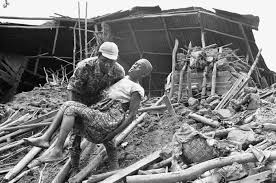On October 4, 1967, silence fell over Enugu. The city that had become the beating heart of Biafra, a symbol of defiance, a declaration of dignity, was captured by federal troops. Doors were shut, streets emptied, voices silenced. What fell that day was more than a capital; it was the weight of a people’s dream crashing under the boots of war.
Capitals are not just geography. They are symbols. And when a capital falls, it does not only mark a shift of power, it marks a rupture of hope.
Enugu as a Symbol of Hope
In 1967, when Biafra declared its secession, Enugu rose as its capital; a city of red earth and coal, transformed into a seat of resistance.
It was not just about politics. For the millions who looked to Enugu, the city embodied self-determination, the belief that a people betrayed by Nigeria’s broken promises could chart their own destiny. The air was thick with both fear and resolve, but the dream of a free homeland burned brighter.
When Enugu stood, Biafra stood. And when Enugu fell, the war entered a darker chapter.
The Fall – A Dream Shattered

The capture of Enugu by federal forces was not merely a military victory. It was a symbolic one.
A capital city represents the heart of a people’s will. Its fall was designed to break that will. Families fled with nothing but their breath. Leaders scattered. A city once alive with the rhythm of resistance was drowned in the silence of fear.
And yet, beyond the immediate tragedy, the fall of Enugu spoke to something larger: the fragility of Nigeria’s independence dream itself. Seven years after the Union Jack was lowered in Lagos, a capital in the east lay in ruins, proof that independence had birthed division instead of unity.
From Enugu to Abuja – Capitals as Broken Promises
If Enugu symbolized a dream betrayed in war, Abuja was meant to symbolize renewal.
Chosen as Nigeria’s new capital in the 1970s and officially made the capital in 1991, Abuja was designed to heal ethnic tensions. It was meant to be neutral ground, a center where no tribe or region claimed superiority. The city of marble and wide boulevards was supposed to embody fairness, justice, and the promise of a new Nigeria.
But Abuja, like Enugu, carries its own betrayal. The city gleams with glass towers, yet millions beyond its gates live in hunger and neglect. Decisions made in air-conditioned chambers rarely translate to bread on the tables of ordinary Nigerians. For many, Abuja is not a capital of the people, but a fortress of power.
Enugu was lost by force. Abuja is lost by corruption and indifference. Both tell the same story: a capital can rise, but if it is not rooted in justice, it will fall, whether to soldiers or to betrayal.
Hope vs. Betrayal – The Lesson of Enugu
The fall of Enugu is not just history; it is warning.
It tells us that independence without equity is fragile, that a nation without fairness will fracture, that betrayal repeated enough times can silence even the loudest of dreams.
Abuja today mirrors the same lesson. It stands, but it does not stand for all. It rises, but not for the hungry, the unemployed, the displaced. The same fragility that brought down Enugu echoes in the marble corridors of Abuja and in the restless streets of Nigeria.
Whose Capital, Whose Independence?
The deeper question is this: in 65 years of independence, has Nigeria ever had a capital that truly belonged to its people?
- Lagos was once the face of colonial departure.
- Enugu became the heart of rebellion, only to be crushed.
- Abuja was built as the promise of unity, but became the theater of betrayal.
If none of our capitals embody true belonging, then perhaps the problem is not the city, it is the foundation of our independence itself.
Capitals Fall, But Freedom Must Not
When Enugu fell, it was more than walls collapsing. It was the fall of a people’s faith in Nigeria’s promise. Today, Abuja rises, but without justice it is only another capital waiting for its reckoning.
The fall of Enugu reminds us that freedom is not about territory, nor is it anchored in marble or maps. Freedom is a living thing, nourished by justice, sustained by dignity, protected by truth.
Capitals may fall, but freedom must not. If Enugu fell, and Abuja betrays, then it is up to us to imagine a freedom that no city can contain, and no army can silence.
